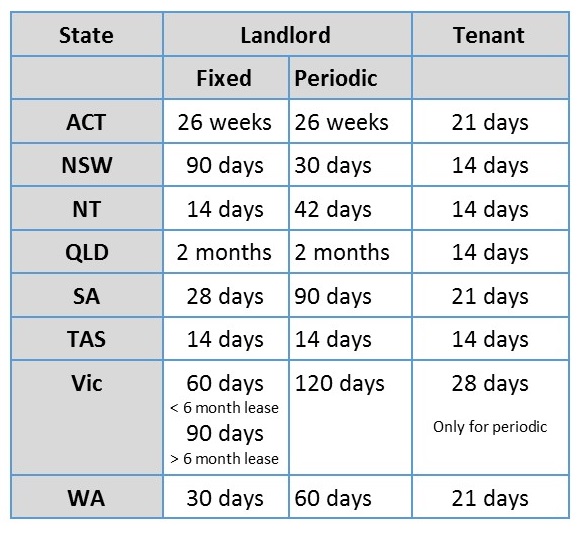
26 Feb ‘Without Grounds’ lease terminations
Existing Residential Tenancy laws are currently under review in a few states across the nation. This has seen media reports on submissions from tenant representative groups claiming that existing laws unfairly favour landlords, especially in relation to the ‘without grounds’ provision for lease terminations. This post will explain what the ‘without grounds’ provision is and why, in Honest Broker’s view, it should remain an option.
Firstly, I’d like to stress two important points which seem to have been overlooked in the tenant related submissions to the legislative review panels:
1. The ‘without grounds’ provision can be used by the tenant as well as the landlord
2. Using the provision does not waive the party’s obligations to abide by the necessary notice period. For example, if a Queensland landlord wants to terminate on a without grounds basis, the notice period must be 2 clear months. Contrast this with a Queensland tenant’s requirement to give only 14 days’ notice (see table at the end of the post).
What does a ‘without grounds’ termination mean?
Laws in each state list specific reasons why a lease can be terminated by either the tenant or the landlord. These reasons range from non-payment of rent or malicious damage,to the property being sold, owners moving back in or the owner failing to maintain the property.
There is also the provision of ‘without grounds’ which basically means the landlord or the tenant can terminate the lease for a reason that does not fit any of the other grounds and does not have to be specifically stated.
Why have a ‘without grounds’ provision?
Basically, it gives both tenants and landlords freedom of choice. The presence of the provision allows either party to extricate themselves from a leasing arrangement they do not wish to continue. Perhaps the tenant is moving to a better property. Maybe the landlord wants a relative to make use of the premises (some states have an ‘immediate family member moving in’ provision but not all). Maybe one party just doesn’t get on with the other. I’ve seen the provision used by tenants who have had enough of dealing with a very poor property manager.
The without grounds provision is essential to cover the multitude of reasons that do not meet the other criteria for lease termination. So either we have an endless list of possible reasons, or we ask people to lie about the reason or we have a ‘without grounds’ that fills the vacuum.
Importantly, the use of the without grounds provision does not imply the other party has done anything wrong; unlike termination on many other grounds. This understanding is widely accepted in the property management industry.
At the end of the day, the rental property in question belongs to the landlord. As the owner, if they do not wish to continue leasing to a particular tenant, then surely they have every right to end the arrangement in a lawful manner. Similarly, by removing the provision, tenants will also lose the right to make a reasonable and lawful decision.
If the landlord or the tenant does not act lawfully during the process, then there is recourse to the services of Tenancy Advocates, Tenancy Mediation, Tribunals and Anti-discrimination Commissions if necessary.
What are the notice periods when using the ‘without grounds’ provision?
As always with residential tenancies, these vary from state to state. However one thing is consistent, in all bar the Northern Territory and Tasmania, the landlord must comply with a much longer notice period than the tenant.

A final comment about the language used in this debate
Consider this sentence taken from the website of Choice :
“Of the 34 OECD countries, Australia is one of the few that allows no-grounds evictions. This means landlords can get rid of renters at the end of their short lease without a reason.”
The use of words such as ‘eviction’ and ‘get rid of’ is deliberately emotive and misrepresents the perfectly legal and reasonable without grounds provisions that are used every day across Australia.
What if we rewrite the text from the landlord’s perspective–after all tenants can avail themselves of the without grounds provisions too:
“Of the 34 OECD countries, Australia is one of the few that allows tenants to leave on an no-grounds basis. This means tenants can dump their landlords at the end of their lease without a reason and in many states, with not much notice.”



Sorry, the comment form is closed at this time.